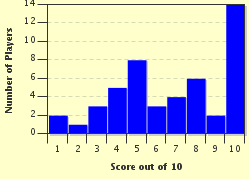Quiz Answer Key and Fun Facts
1. The poem appears to be based on the version of "Judith" found in what translation of the Bible?
2. Do we know who is the author of "Judith"?
3. Judith is called "strong servant of the Savior." What is this an example of?
4. Who does Judith decapitate in the poem?
5. Why does the Assyrian captain send for Judith to come to his chamber?
6. What does Judith's name mean?
7. How is Judith able to decapitate the Assyrian commander?
8. How many blows does it take Judith to decapitate the Assyrian commander?
9. From what city is Judith?
10. "Judith" is unique in that it is the only Anglo-Saxon poem we have that exists as a complete manuscript rather than a fragment.
Source: Author
skylarb
This quiz was reviewed by FunTrivia editor
Bruyere before going online.
Any errors found in FunTrivia content are routinely corrected through our feedback system.

